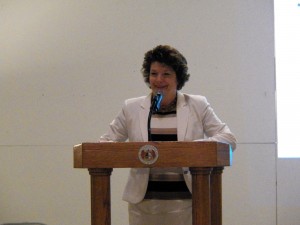
JEFFERSON CITY, Mo. — “Geographic proximity is as close as your smartphone,” said Rebecca McClanahan, Missouri Nurses Association President. This is a common feeling among Missouri’s advanced practicing registered nurses who gathered in the capitol last Thursday to show support for Senate bills No. 659 and 700. The bills are an attempt to level the playing field for Missouri nurses, they say. McClanahan told The Missouri Times that Missouri nurses have the strictest limitations on how they can practice medicine in the United States.
The key to today’s gathering, being that is so early on in session is to educate legislators, letting legislators know what the difference is between a APRN and a RN, lobbyist Kyna Iman told the Missouri Times.
Senate Bill 700 will remove restrictions required for a “collaborative practice arrangement” and instead requires “effective electronic communication.” Under current regulations dating back to 1993, APRN’s and Registered Nurses are required to live within 30 miles of their practice or physician, or 50 miles in a designated shortage area.
“We need to enable the providers we have” McClanahan said.
SB 700 is also an effort to get APRN’s more plenary privileges, which would lead to more of a complete practice by nurses, McClanahan said. 18 states in the U.S. have plenary privileges for nurses.
This legislation would also remove joint rule making for everything except rules regarding controlled substance prescriptive authority.
The bill also seeks to remove the five day limit on APRN prescriptive authority for schedule three drugs, and authorizes prescriptive authority for schedule two drugs, thus expanding the drugs APRN’s are authorized to provide.
Senate Bill 659 will allow APRN’s to engage in the practice of advanced practice professional nursing. It would also make APRN’s accountable to patients and the board of nursing for the quality of care rendered and for the consulting with, or referring to other providers, when appropriate.
“The thing that drives the people here is they see people in their area that need care,” said McClanahan.
All licensed APRN’s would also be authorized to prescribe medication within nurse’s practice and specialty and prescribe, produce, administer, and dispense the medication. McClanahan is positive about Senate Bill’s 700 and 659.
Lt. Gov. Peter Kinder, a Republican, was also on hand at the gathering to give an impromptu speech regarding the nurses and their supported bills.
“I think it’s important to stand up for healthcare professionals like you,” Kinder said.
The Missouri Nurses Association has also scheduled other gatherings such as today in upcoming months including one in Columbia on April 10, and two more at the Capitol on July 16 and Nov. 6.



